Erythema multiforme: distinguishing hypersensitivity reactions, drug allergy, or herpes simplex infection
Cutaneous reactions present a diagnostic challenge, mainly when multiple factors, such as infections, medications, and environmental triggers, contribute to the clinical picture. Erythema multiforme
[...] Read more.
Cutaneous reactions present a diagnostic challenge, mainly when multiple factors, such as infections, medications, and environmental triggers, contribute to the clinical picture. Erythema multiforme (EM) is an acute, self-limiting mucocutaneous disorder that is most commonly triggered by herpes simplex virus (HSV) but can also be associated with drug-induced hypersensitivity reactions. Diagnosing EM becomes even more complex in patients taking photosensitizing medications, such as doxycycline, which can cause phototoxic or photoallergic reactions. Differentiating between drug-induced and infection-associated EM, as well as distinguishing it from more severe conditions like Stevens-Johnson syndrome (SJS), is crucial for appropriate management. This case report presents a case of a 57-year-old Caucasian female with a history of penicillin allergy who developed a phototoxic reaction to doxycycline following sun exposure. She was treated with silver sulfadiazine for her skin lesions but subsequently developed EM, with target-like lesions predominantly on the legs and a concurrent herpes simplex labialis infection. Laboratory findings were unremarkable, and there was no mucosal involvement. Given the suspected drug-induced nature of the reaction and the presence of HSV, a cautious approach was taken. Treatment with oral prednisone led to the resolution of symptoms without recurrence. Patch testing for doxycycline and silver sulfadiazine was omitted due to the risk of severe cutaneous adverse drug reactions (SCARs) and their non-essential status. Instead, penicillin testing was prioritized due to its clinical importance, and the patient successfully passed the oral amoxicillin challenge. This case highlights the diagnostic challenges of differentiating between drug-induced, infection-triggered, and photosensitivity-related cutaneous reactions. A careful evaluation of medication history, infection status, and clinical presentation is essential to guide the management of this condition.
Vesna Vukičević Lazarević
View:106
Download:5
Times Cited: 0
Cutaneous reactions present a diagnostic challenge, mainly when multiple factors, such as infections, medications, and environmental triggers, contribute to the clinical picture. Erythema multiforme (EM) is an acute, self-limiting mucocutaneous disorder that is most commonly triggered by herpes simplex virus (HSV) but can also be associated with drug-induced hypersensitivity reactions. Diagnosing EM becomes even more complex in patients taking photosensitizing medications, such as doxycycline, which can cause phototoxic or photoallergic reactions. Differentiating between drug-induced and infection-associated EM, as well as distinguishing it from more severe conditions like Stevens-Johnson syndrome (SJS), is crucial for appropriate management. This case report presents a case of a 57-year-old Caucasian female with a history of penicillin allergy who developed a phototoxic reaction to doxycycline following sun exposure. She was treated with silver sulfadiazine for her skin lesions but subsequently developed EM, with target-like lesions predominantly on the legs and a concurrent herpes simplex labialis infection. Laboratory findings were unremarkable, and there was no mucosal involvement. Given the suspected drug-induced nature of the reaction and the presence of HSV, a cautious approach was taken. Treatment with oral prednisone led to the resolution of symptoms without recurrence. Patch testing for doxycycline and silver sulfadiazine was omitted due to the risk of severe cutaneous adverse drug reactions (SCARs) and their non-essential status. Instead, penicillin testing was prioritized due to its clinical importance, and the patient successfully passed the oral amoxicillin challenge. This case highlights the diagnostic challenges of differentiating between drug-induced, infection-triggered, and photosensitivity-related cutaneous reactions. A careful evaluation of medication history, infection status, and clinical presentation is essential to guide the management of this condition.
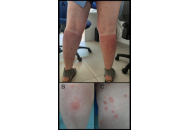 Erythema multiforme: distinguishing hypersensitivity reactions, drug allergy, or herpes simplex infectionOpen AccessCase ReportCutaneous reactions present a diagnostic challenge, mainly when multiple factors, such as infections, medications, and environmental triggers, contribute to the clinical picture. Erythema multiforme [...] Read more.Vesna Vukičević LazarevićPublished: March 20, 2025 Explor Immunol. 2025;5:1003188
Erythema multiforme: distinguishing hypersensitivity reactions, drug allergy, or herpes simplex infectionOpen AccessCase ReportCutaneous reactions present a diagnostic challenge, mainly when multiple factors, such as infections, medications, and environmental triggers, contribute to the clinical picture. Erythema multiforme [...] Read more.Vesna Vukičević LazarevićPublished: March 20, 2025 Explor Immunol. 2025;5:1003188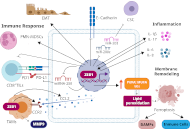 Role of ZEB1 in immune response, inflammation and membrane remodeling during neoplasiaOpen AccessReviewImmune response, inflammation, and lipid metabolism have important effects on cancer development and progression. Several proteins in tumoral cells and/or tumor microenvironment are involved in any [...] Read more.Alicia Maria Reveles-Espinoza ... Alba Adriana Vallejo-CardonaPublished: March 20, 2025 Explor Immunol. 2025;5:1003187
Role of ZEB1 in immune response, inflammation and membrane remodeling during neoplasiaOpen AccessReviewImmune response, inflammation, and lipid metabolism have important effects on cancer development and progression. Several proteins in tumoral cells and/or tumor microenvironment are involved in any [...] Read more.Alicia Maria Reveles-Espinoza ... Alba Adriana Vallejo-CardonaPublished: March 20, 2025 Explor Immunol. 2025;5:1003187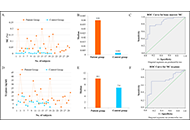 Bone marrow mast cells and mast cell tryptase in plasma cell disordersOpen AccessOriginal ArticleAim: Plasma cell disorders (PCD), a group of B-cell neoplasms, have undefined etiology. Mast cells (MC) have been found to promote the proliferation and differentiation of B cells in several B ce [...] Read more.Raveena Yadav ... Yashwant KumarPublished: March 12, 2025 Explor Immunol. 2025;5:1003186
Bone marrow mast cells and mast cell tryptase in plasma cell disordersOpen AccessOriginal ArticleAim: Plasma cell disorders (PCD), a group of B-cell neoplasms, have undefined etiology. Mast cells (MC) have been found to promote the proliferation and differentiation of B cells in several B ce [...] Read more.Raveena Yadav ... Yashwant KumarPublished: March 12, 2025 Explor Immunol. 2025;5:1003186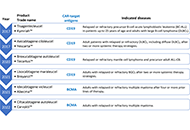 A new therapeutic pathway in autoimmune diseases: chimeric antigen receptor T cells (CAR-T) targeting specific cell subtypes or antigen-specific B lymphocytes—a brief reviewOpen AccessReviewIn hematological malignancies, autologous immunotherapy with T lymphocytes expressing a chimeric antigen receptor (CAR-T) has been successfully applied. CAR enhances the immuno-cellular effector sys [...] Read more.María Fernanda Segovia ... Gerson D. KeppekePublished: March 04, 2025 Explor Immunol. 2025;5:1003185
A new therapeutic pathway in autoimmune diseases: chimeric antigen receptor T cells (CAR-T) targeting specific cell subtypes or antigen-specific B lymphocytes—a brief reviewOpen AccessReviewIn hematological malignancies, autologous immunotherapy with T lymphocytes expressing a chimeric antigen receptor (CAR-T) has been successfully applied. CAR enhances the immuno-cellular effector sys [...] Read more.María Fernanda Segovia ... Gerson D. KeppekePublished: March 04, 2025 Explor Immunol. 2025;5:1003185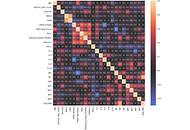 Cytokine profiles and neurological manifestations in post-COVID syndromeOpen AccessOriginal ArticleAim: The objectives of our study were to evaluate a range of circulating biomarkers in COVID-19-related long-term neurological dysfunction. Methods: The study involved 30 patients with post [...] Read more.Yulia Desheva ... Alexander SuvorovPublished: February 24, 2025 Explor Immunol. 2025;5:1003184
Cytokine profiles and neurological manifestations in post-COVID syndromeOpen AccessOriginal ArticleAim: The objectives of our study were to evaluate a range of circulating biomarkers in COVID-19-related long-term neurological dysfunction. Methods: The study involved 30 patients with post [...] Read more.Yulia Desheva ... Alexander SuvorovPublished: February 24, 2025 Explor Immunol. 2025;5:1003184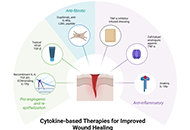 The role of cytokines in wound healing: from mechanistic insights to therapeutic applicationsOpen AccessReviewWound healing is an area of growing importance in the healthcare field, especially chronic wounds associated with comorbidities like diabetes mellitus (DM), hypoxic stress, obesity, and malnutrition [...] Read more.Rachel Si-Yin Wong ... Dinesh Kumar SrinivasanPublished: February 11, 2025 Explor Immunol. 2025;5:1003183
The role of cytokines in wound healing: from mechanistic insights to therapeutic applicationsOpen AccessReviewWound healing is an area of growing importance in the healthcare field, especially chronic wounds associated with comorbidities like diabetes mellitus (DM), hypoxic stress, obesity, and malnutrition [...] Read more.Rachel Si-Yin Wong ... Dinesh Kumar SrinivasanPublished: February 11, 2025 Explor Immunol. 2025;5:1003183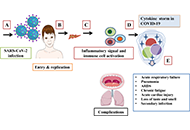 Microbiome and mycobiome cross-talk from an immunobiotic perspective in COVID-19 and post-acute COVID-19 syndromeOpen AccessReviewCoronavirus disease 2019 (COVID-19) infected individuals showed either mild symptoms or is paucisymptomatic, with severe impact on human health, revealing heightened risk and direct effects on healt [...] Read more.Sunny Kumar ... Sriram SeshadriPublished: February 11, 2025 Explor Immunol. 2025;5:1003182
Microbiome and mycobiome cross-talk from an immunobiotic perspective in COVID-19 and post-acute COVID-19 syndromeOpen AccessReviewCoronavirus disease 2019 (COVID-19) infected individuals showed either mild symptoms or is paucisymptomatic, with severe impact on human health, revealing heightened risk and direct effects on healt [...] Read more.Sunny Kumar ... Sriram SeshadriPublished: February 11, 2025 Explor Immunol. 2025;5:1003182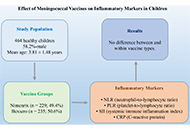 The effect of meningococcal vaccines on new generation of systemic inflammatory markers in childrenOpen AccessOriginal ArticleAim: Immunization with meningococcal vaccine (MV) is the most effective measure to control and prevent the transmission of meningococcal infections. In this study, in order to support the appropr [...] Read more.Omer Okuyan ... Hafize UzunPublished: January 23, 2025 Explor Immunol. 2025;5:1003181
The effect of meningococcal vaccines on new generation of systemic inflammatory markers in childrenOpen AccessOriginal ArticleAim: Immunization with meningococcal vaccine (MV) is the most effective measure to control and prevent the transmission of meningococcal infections. In this study, in order to support the appropr [...] Read more.Omer Okuyan ... Hafize UzunPublished: January 23, 2025 Explor Immunol. 2025;5:1003181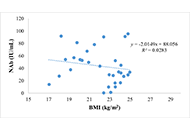 Factors associated with the formation of neutralizing antibodies post-vaccination: a lesson from COVID-19 vaccinationOpen AccessOriginal ArticleAim: This study aims to identify the factors affecting the formation of neutralizing antibodies (NAbs) in healthy adults four weeks post-COVID-19 vaccination. Methods: A cross-sectional stu [...] Read more.Hana Ratnawati ... Steven FelimPublished: January 22, 2025 Explor Immunol. 2025;5:1003180
Factors associated with the formation of neutralizing antibodies post-vaccination: a lesson from COVID-19 vaccinationOpen AccessOriginal ArticleAim: This study aims to identify the factors affecting the formation of neutralizing antibodies (NAbs) in healthy adults four weeks post-COVID-19 vaccination. Methods: A cross-sectional stu [...] Read more.Hana Ratnawati ... Steven FelimPublished: January 22, 2025 Explor Immunol. 2025;5:1003180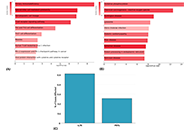 Characterizing immune biomarkers and effector CD8+ T-cell exhaustion in pancreatic adenocarcinoma via single-cell RNA sequencing profilingOpen AccessOriginal ArticleAim: Pancreatic ductal adenocarcinoma (PDAC) is a leading cause of cancer-related mortality and is characterized by T-cell exhaustion, particularly in effector CD8+ T-cells. This exhaustion, driv [...] Read more.Rawaa AlChalabi ... Ahmed AbdulJabbar SuleimanPublished: January 21, 2025 Explor Immunol. 2025;5:1003179
Characterizing immune biomarkers and effector CD8+ T-cell exhaustion in pancreatic adenocarcinoma via single-cell RNA sequencing profilingOpen AccessOriginal ArticleAim: Pancreatic ductal adenocarcinoma (PDAC) is a leading cause of cancer-related mortality and is characterized by T-cell exhaustion, particularly in effector CD8+ T-cells. This exhaustion, driv [...] Read more.Rawaa AlChalabi ... Ahmed AbdulJabbar SuleimanPublished: January 21, 2025 Explor Immunol. 2025;5:1003179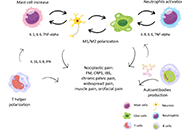 The putative role of immune-inflammatory mechanisms in nociplastic pain pathways: a narrative reviewOpen AccessReviewNociplastic pain is the fourth category of pain defined in recent years. It is a pain arising from altered nociception, despite the lack of clear evidence of actual or threatened tissue damage that [...] Read more.Mariateresa Giglio ... Filomena PuntilloPublished: January 13, 2025 Explor Immunol. 2025;5:1003178
The putative role of immune-inflammatory mechanisms in nociplastic pain pathways: a narrative reviewOpen AccessReviewNociplastic pain is the fourth category of pain defined in recent years. It is a pain arising from altered nociception, despite the lack of clear evidence of actual or threatened tissue damage that [...] Read more.Mariateresa Giglio ... Filomena PuntilloPublished: January 13, 2025 Explor Immunol. 2025;5:1003178